|
|
|
Sort Order |
|
|
|
Items / Page
|
|
|
|
|
|
|
| Srl | Item |
| 1 |
ID:
132632
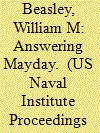

|
|
|
|
|
| Publication |
2014.
|
| Summary/Abstract |
Following the outbreak of World War I, President Woodrow Wilson explained his policy: "A powerful Navy we have always regarded as our proper and natural means of defence…. We shall take leave to be strong upon the seas, in the future as in the past; and there will be no thought of offence or provocation in that. Our ships are our natural bulwarks. Today, our natural bulwarks are crumbling. Seth Cropsey's 2013 book Mayday: the decline of American Naval Supremacy warns that if left unaltered, current defence cuts and procurement policy will destroy the global presence of the US navy.
|
|
|
|
|
|
|
|
|
|
|
|
|
|
|
|
| 2 |
ID:
132635
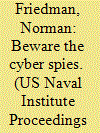

|
|
|
|
|
| Publication |
2014.
|
| Summary/Abstract |
In May, the U.S. government circulated a wanted poster showing five members of a shadowy Chinese cyber-espionage unit. No one expects any of them to turn up in a U.S. courtroom, but the object of the publicity was twofold. First, it was intended to show the Chinese that the U.S. government takes their operations seriously, that it can and will retaliate in some unspecified way. It is as pointless to ask the Chinese (and many others) to abandon cyber espionage as it would be to seek an international treaty barring any other kind of spying. The spies would stay in business, but some naive governments would abandon counterespionage, and cease any spying of their own.
|
|
|
|
|
|
|
|
|
|
|
|
|
|
|
|
| 3 |
ID:
132549
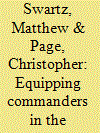

|
|
|
|
|
| Publication |
2014.
|
| Summary/Abstract |
Ever since the late half of the 1770s, the U.S. Navy's commanding officers have operated around the world and around the clock they do so often under austere conditions, always mindful of the danger posed by enemies and dynamic physical environment. Action-oriented Cos must exercise authority over their sailors and other assigned and attached combat forces in a prompt, sustained, and effective manner. The Navy's Information Dominance Corps and its partners work to ensure that these leaders have to the technological basis they need for today's military operations and warfighting scenarios, as sophisticated state and non-state actors seek to gain control of only the physical realm, but also the increasingly important cyber and electromagnetic (EM) domains. Our capstone technological capability, enabled by battlespace awareness and integrated fires, is what we call Assured Command and Control (C2).
|
|
|
|
|
|
|
|
|
|
|
|
|
|
|
|
| 4 |
ID:
132589


|
|
|
|
|
| Publication |
2014.
|
| Summary/Abstract |
Integrated-fires capabilities are a central part of the asymmetric advantage our Navy, joint, and coalition forces bring to a fight. They include capabilities that disrupt adversary command and control, communication, computing, intelligence, surveillance, and reconnaissance (C4ISR) Systems; deliver electronic payloads that limit an enemy's freedom of maneuver and action; and enhance the ability of our own forces to place ordnance on target. It integrates lethal and non-lethal fires, underpinned by superior battlespace awareness and assured command and control, to provide commanders an expanded set of warfighting tools especially important in anti-access and area-denial (A2/AD) environments, like Air-Sea Battle.
|
|
|
|
|
|
|
|
|
|
|
|
|
|
|
|
| 5 |
ID:
132550
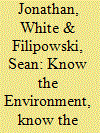

|
|
|
|
|
| Publication |
2014.
|
| Summary/Abstract |
Chief of Naval operations Admiral Jonathan Greenert has described the U.S. Navy as America' s away team. The sport reference reflects one of the CNO's main tenets: "Operated forwards". The goal is to ensure that our nation's conflicts are conducted in the backyards og our adversaries, not ours. We take the fight to them.
But any sport enthusiast knows about the home-field advantage, the benefits that accrue to the local team when playing in its own environment, which it knows better than the visiting team does. This applies in warfare as well. Taking the fight to the enemy risk giving him the home-field advantage.
|
|
|
|
|
|
|
|
|
|
|
|
|
|
|
|
| 6 |
ID:
132590
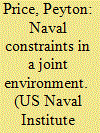

|
|
|
|
|
| Publication |
2014.
|
| Summary/Abstract |
Information system for the navy need to be created keeping in mind that a deployed aircraft, ship, or submarine does not have immediate or sustained support from a shore-based command. Thus, the author says that 'A central controlling agency such as DISA would not be able to effectively operate from these independent-warfare platforms." Here, operations specialist second class Chelsea Ashley monitors an automated information system on the bridge of the guided-missile destroyer USS Donald Cook to track nearby contacts.
|
|
|
|
|
|
|
|
|
|
|
|
|
|
|
|
| 7 |
ID:
132537


|
|
|
|
|
| Publication |
2014.
|
| Summary/Abstract |
Our Navy's forward presence protects the interconnected global system of trade and reinforces the security of the U.S. economy. Our engagement around the world reassures allies, builds trust with partners and friends, and prevents and deters wars. We are the foundation of the nation's "away game," endowed with operational agility, possessed with innovative resourcefulness, and armed with credible combat power to be used where it matters, when it matters. Sustaining our global primacy requires that we dominate the battlespace on, above, and below the surface of the sea, as well as outer space. However, successfully commanding, controlling, and fighting our forces in these areas requires dominance in the information domain, to include the electromagnetic spectrum and cyberspace.
|
|
|
|
|
|
|
|
|
|
|
|
|
|
|
|
| 8 |
ID:
132619


|
|
|
|
|
| Publication |
2014.
|
| Summary/Abstract |
After more than a decade of fighting in the Middle East, President Barack Obama announced that these wars are coming to an end. The new national strategy shifts the military's focus to maintaining peace in the pacific through cooperative alliances rather than conflict. This poses two serious challenges. First, we must prepare current and future military leaders to execute a peacekeeping strategy that relies on military diplomacy far more than kinetic conflict.
|
|
|
|
|
|
|
|
|
|
|
|
|
|
|
|
| 9 |
ID:
132591
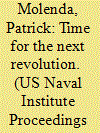

|
|
|
|
|
| Publication |
2014.
|
| Summary/Abstract |
Recent events, both in our nation's capital and across the globe, indicate that the Navy Faces an increasingly constrained financial environment and an uncertain international landscape characterized by both risk and opportunity. To set a course through an emerging era of maritime-centric security challenges, the Navy will require talented officers and future leaders who possess solid intellectual and critical thinking foundations coupled with a host of practical skills. Unfortunately, Navy shortfalls regarding advanced education are well documented, with many critics asserting that the service does not value higher learning.
|
|
|
|
|
|
|
|
|
|
|
|
|
|
|
|
| 10 |
ID:
132534


|
|
|
|
|
| Publication |
2014.
|
| Summary/Abstract |
In the 1890s, with the first steps toward rebuilding the U.S. Navy under way, the pages of the open forum of the Naval Institute proceeding are a study in constructive, forward-looking thinking about the priority issues to be examined with the coming of the new steam-and-steel era. There is a vital energy in the essay of naval officers writing on the advance in warship design, armor, guns, range-finders, smokeless gun power, explosives and ordnance materials, and the nature and role of new weapons such as the automobile (self-propelled) torpedo, and new power sources such as electricity. Other article capture the greater advances in the British and French Navies, and lament the way the Navy has drifted out of touch from the great body of the American people.
|
|
|
|
|
|
|
|
|
|
|
|
|
|
|
|
|
|
|
|
|